BLA filed, big brains recruited—Nanoscope is charging ahead with its promising gene-agnostic therapy for retinitis pigmentosa.
Nanoscope Therapeutics (Texas, USA) is going full throttle with not one, but two major moves: initiating a rolling Biologics License Application (BLA) for its investigational, restorative, gene-agnostic retinitis pigmentosa (RP) therapy, MCO-010, and assembling a powerhouse Visionary Advisory Committee to help steer its next chapter.
READ MORE: The Next-Gen Arsenal of Genomic Tools for IRDs and Other Eye Diseases Lighting Up ARVO 2025 – PIE
The BLA journey
Nanoscope has officially begun its rolling BLA submission to the U.S. Food and Drug Administration (FDA) for MCO-010, its gene-agnostic therapy for retinitis pigmentosa (RP). The first BLA modules are in, with full submission expected in early 2026. Thanks to MCO-010’s fast track designation, the application qualifies for priority review, a potential fast lane to what could be a groundbreaking treatment.
“For the first time, patients who are considered to be on a path to permanent blindness may have a chance to regain sight,” said Sulagna Bhattacharya, CEO and co-founder of Nanoscope, in a news release. “We are deeply thankful to the FDA for their guidance as we remain steadfast in our mission to restore vision and bring light back into the lives of those living in darkness.”
MCO-010 is the first gene-agnostic therapy for retinal disease to reach the BLA submission stage. But the hype goes beyond that: not only is MCO-010’s efficacy independent from a specific gene mutation, but it is also restorative, potentially bringing sight back to RP patients who have already lost vision.
Delivered via a single in-office intravitreal injection, MCO-010 activates dormant bipolar retinal cells, making them light sensitive and tapping into the eye’s remaining visual circuitry after photoreceptor loss.
In the pivotal RESTORE Phase IIb trial, MCO-010 met its primary endpoint for best corrected visual acuity (BCVA) at 52 weeks in both dose arms, compared to the sham-control. Patients experienced vision gains greater than 0.3 LogMAR, which is at least three lines on the eye chart. These improvements persisted through three years in ongoing follow-up.
READ MORE: Beyond the Genetic Code at ARVO 2025: Breakthrough Approaches to Retinal Repair – PIE
Meet the visionary committee
Alongside the regulatory milestone, Nanoscope has launched its new Visionary Advisory Committee to guide its scientific, clinical and community outreach strategy.
Chaired by Dr. SriniVas Sadda (UCLA/Doheny Eye Institute), the committee brings together a start-studded cast of global leaders in retina, including:
- Dr. Allen Ho (Thomas Jefferson University)
- Dr. Peter Kaiser (Cleveland Clinic)
- Dr. Christine Kay (Vitreoretinal Associates)
- Dr. Arshad Khanani (University of Nevada, Reno)
- Dr. Vinit Mahajan (Stanford University)
- Dr. Jordi Monés (Institut de la Màcula, Barcelona)
- Dr. Mark Pennesi (Casey Eye Institute, Oregon Health & Science University).
“As retina specialists, we face a desperate need to change the conversation about blindness with our patients — from one of inevitability to one of possibility,” said Dr. Sadda. “I’m honored to be part of a team that believes the status quo is not set in stone, and that restoration of vision is not a dream—it’s a goal within reach.”
The committee’s formation marks a key moment in Nanoscope’s evolution as it prepares to bring a first-in-class, gene-agnostic therapy to market. With perspectives from both academic and clinical leaders, the group is expected to help shape future development, patient education and broader adoption strategies.
“One of the most challenging aspects of my entire career has been telling patients with RP there is no restorative treatment available as they experience progressive, irreversible, permanent vision loss,” said Dr. Ho, who also serves as Nanoscope’s chief medical advisor. “Based on the preclinical science and evidence in clinical trials, MCO-010 represents a potential, important paradigm shift for patients and retina specialists, providing hope for meaningful improvement in the quality of life for the neediest retina patients of all.”
Editor’s Note: This content is intended exclusively for healthcare professionals. It is not intended for the general public. Products or therapies discussed may not be registered or approved in all jurisdictions, including Singapore.

